Jonathan Logan
Science & Environment Editor
In 2014, the S.T.E.M. Success Initiative (SSI) was launched to “empower Wooster S.T.E.M. faculty, staff and students in cultivating an inclusive community to better support the academic success S.T.EM. identity development for students from underrepresented groups.” While this is the stated mission of the SSI, it is a far cry from capturing the broad ideas and unique goals of the faculty who lead the initiative. The SSI takes a three-pronged approach to achieving its goal of empowering the Wooster S.T.E.M. community: academic support, professional development and inclusive excellence. Encompassing each of these areas is a robust effort to cultivate external relationships with like-minded groups throughout the College. The SSI, composed of various working groups and an advisory board with a yearly, rotating membership, encourages students to see themselves in S.T.E.M. You can break down barriers.
In the area of academic support, the SSI operates the S.T.E.M. Zone. The Zone and its student employees, Zone Interns, have developed an exceptional reputation across all departments. Relationships cultivated at the Zone between young students and interns are about more than homework help. Each relationship could be the difference between a student walking away from the Zone with a feeling of belonging or the all too familiar — but extremely false — perception that S.T.E.M. is not for them.
Kara Melrose, the SSI coordinator, says that the pandemic has made growing these relationships much more difficult. Face-to-face interaction is invaluable to the SSI and the success of the Zone. Melrose elaborated, saying “the informal mentoring environment is hard to create virtually.” However, Melrose, along with Professor Niklas Manz of the physics department, have leaned into this loss. Both Melrose and Manz believe that the pandemic has given them more opportunity to reach out to students virtually. Moving forward, these new virtual capabilities will aid and abet their mission — especially in the area of academic support.
The SSI aims to create an inclusive community. Professor Megan Pollock, chair of the SSI advisory board, stated that “the complexity of issues students face requires diverse groups” to apply their minds and experiences to the evolving fields of S.T.E.M. Over 84 percent of the current S.T.E.M. workforce in the United States is composed of white males, according to the National Science Foundation. Encouraging students from all backgrounds to see themselves in S.T.E.M., breaking down these barriers is intrinsic to the mission of the SSI.
The advisory board, consisting of staff from CDI, the Learning Center, the SSI coordinator and professors, meets weekly to discuss ways in which they can nurture a more inclusive environment in the classroom. Missy Schen, director of educational assessment and another member of the advisory board, explained that the board reviews best practices each week that make the classroom a more congenial space. These practices include “think-pair-share questions and promoting group work” after careful review of peer-reviewed literature in relevant areas, said Schen. In addition to reviewing best practices, professors attend workshops that help them to make their classrooms open to all people of all backgrounds, races, ethnicities and gender identities.
S.T.E.M. identity development, directly mentioned in the initiative’s mission, seeks to not only develop a deep sense of “you are S.T.E.M.” in underrepresented groups, but also to instill this sentiment in all students working toward their bachelor’s degree. Manz, when asked how this applies to students who may feel that they are obligated to obtain a doctorate to become a scientist or mathematician, immediately identified how troubling this idea is. “To say that you are not a physicist, geologist, biologist or mathematician because you don’t go to grad school is very problematic,” Manz explained. S.T.E.M. is a mindset. It is not a credential to be waved around. Instead, scientific and mathematical reasoning are a basic approach to life’s most troubling questions about who we are, where we’re going and why the world functions in all of its weird ways. This identity development is part of SSI’s professional development goal, but S.T.E.M. is much more than a job title, a salary or career acumen. SSI, the faculty, staff and your fellow students want you to know that you are S.T.E.M. and always will be.

